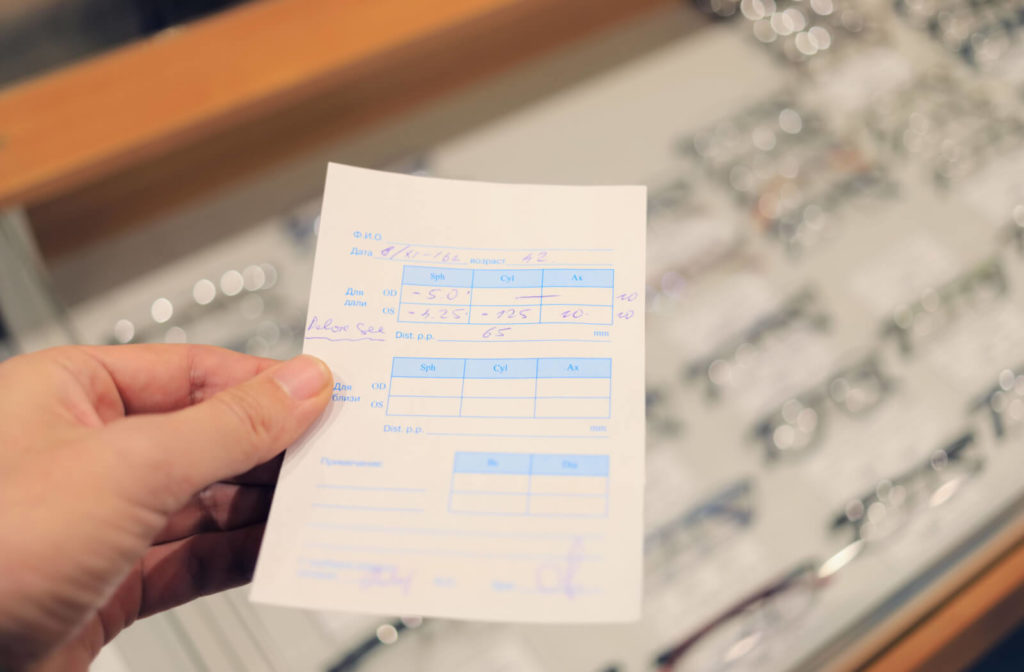If you’re someone who’s been using glasses for years to correct your vision, or you’re just now starting to consider the option, you may be wondering if the prescription for glasses is the same as the prescription for contact lenses.
It’s a common question and one that many people have, especially as more and more people are turning to contact lenses as a viable alternative to glasses.
Your prescriptions for glasses and contact lenses aren’t the same, and there are a few key differences that you should be aware of regarding the two.
What Makes Glasses & Contact Prescriptions Different?
Refractive Error Correction
First, it’s important to understand that glasses and contact lenses work in different ways. Glasses sit in front of the eyes, and the lenses are designed to refract light in such a way as to correct vision.
For example, glasses prescriptions will typically include a sphere and cylinder measurement, which indicates the degree of nearsightedness or farsightedness and the degree of astigmatism.
Contact lenses, on the other hand, sit directly on the surface of the eye. Because of these differences in how the two types of corrective devices work, the prescriptions for glasses and contact lenses won’t be the same.
Measurements
Contact lens prescriptions include information about the size and curvature of the eye, which is not required for glasses prescriptions. They may also include additional measurements such as base curve and diameter to ensure proper fit. This is because contact lenses need to fit snugly and comfortably on the eye, while glasses don’t.
The size and curvature of the eye can affect how well contact lenses will fit and how comfortable they’ll be to wear.
Replacement Schedule
Glasses prescriptions are usually valid for 2 years, whereas contact lens prescriptions are usually valid for 1 year. This is because contact lenses need to be replaced more frequently than glasses. Contact lenses can also be replaced daily, weekly, monthly or quarterly, depending on the type of contact lens.

Glasses vs Contacts Eye Exams
Regular Eye Exams
A regular eye exam, also known as a comprehensive eye exam, is a thorough examination of the eyes that assesses vision and eye health. It is typically conducted by an optometrist and includes a series of tests to evaluate vision, eye movement, and the health of the eyes.
Contact Lens Exam
A contact lens eye exam, on the other hand, is a specialized examination that is specifically designed to evaluate the suitability of a patient for contact lens wear.
It includes all the components of a regular eye exam but also includes additional tests and measurements to determine the best type of contact lens for the patient, such as corneal topography, or measurement of the curvature of the cornea, and measurements of the size and shape of the eye.
Are Contacts for Everyone?
Contact lenses are a popular alternative to glasses for those who want to correct their vision without the hassle of wearing eyeglasses. But there are a few factors to consider before making the switch.
Extra Care & Maintenance
Contacts need proper care and maintenance. Those who aren’t willing or able to properly clean and disinfect their lenses daily shouldn’t wear contacts. Additionally, those who have difficulty handling small objects or have poor dexterity may also have difficulty handling contacts.
Certain Eye Conditions
Certain eye conditions can also make it difficult or even impossible for some individuals to wear contacts. For example, those with dry eyes, severe allergies, or certain kinds of eye infections like conjunctivitis may not be able to wear contacts comfortably.
Pros & Cons of Glasses & Contacts
When it comes down to it, it’s your choice between glasses and contact lenses. Both have their own set of advantages and disadvantages, and the best option for you will depend on your individual needs and preferences.
Glasses
Pros:
- They’re easy to use and don’t require any special care or maintenance.
- They don’t come into contact with the eye, reducing the risk of infection.
- They can provide protection from the sun, wind, and debris.
Cons:
- They can be a nuisance when playing sports or other physical activities.
- They can fog up in humid or cold weather.
- They can be easily lost, misplaced, or broken.
Contact Lenses
Pros:
- They provide a natural, unobstructed view of the world.
- They’re ideal for those who are involved in sports or other physical activities.
- They’re easy to wear with any outfit or hairstyle.
Cons:
- They require proper care and maintenance to prevent infection.
- They can be uncomfortable or cause irritation if not fitted properly.
- They can be lost or misplaced more easily than glasses.
Need to Update Your Prescription?
Whether you’re looking for an updated prescription for your glasses, contact lenses, or both, the team at Crum Optometric Group is here to help. It’s important to consult with an eye doctor to determine the best option for you and to ensure that your glasses or contact lenses are properly fitted and prescribed.






